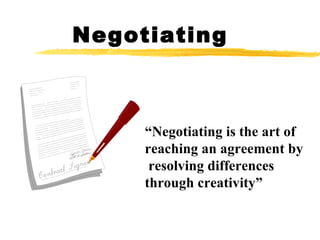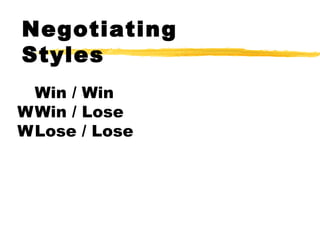Negotiation
- 1. Negotiating “ Negotiating is the art of reaching an agreement by resolving differences through creativity”
- 2. The test of a first-rate intelligence is the ability to hold two opposed ideas in mind at the same time and still retain the ability to function. F. Scott Fitzgerald
- 3. Do Your Homework Know what you want Know the negotiator What’s the negotiator’s model? What does the negotiator want?
- 4. Negotiating Process Style Outcome Principles
- 5. ? Win / Win ? Win / Lose ? Lose / Lose Negotiating Styles
- 6. Style Style is a continuum between two styles: Quick Deliberate Middle is compromise
- 7. Quick Style Negotiate in a hurry Use when you won’t negotiate with these people again Get the best deal without regard to the other side’s “win”
- 8. Deliberate Style Use when long term relationship likely Involves cooperation and relationship building to reach agreement Needs much prep, hard work May move in fits and starts
- 9. Outcomes Realistic Both sides satisfied, win/win situation Usually results from deliberate style Acceptable Likely to result from quick style Something is better than nothing Always ask for a better deal Worst When you’re too stubborn to be flexible Usually from quick style
- 10. Outcomes Predetermine the outcomes before you start negotiations, you have a better chance of getting a better result “ Think carefully, think creatively, and think ahead”
- 11. Principles There are no rules Establish an agenda Everything is negotiable Ask for a better deal Be creative Learn to say “NO” yourself
- 12. Are you a Motivated Negotiator? Enthusiasm Confidence Engaged Recognition Accomplishment Pat on the back Integrity No trickery Trustworthiness Social Skills Enjoy people Interest in others Teamwork Better as a team Self-control Creativity Always looking for ways to complete the deal
- 13. Negotiation Model Investigate Presentation Bargaining Agreement
- 14. Investigate What do you want? What does the other side need? Decide on style What are the consequences of each choice.
- 15. Presentation Prepare other side’s case Present the reasons for your side better Planning sheet Issues involved Realistic, possible, worst
- 16. “ The” Presentation Creative title Reduce to “must know” items Keywords Mini-speeches around keywords Visuals Don’t give concessions just to keep things going Make note of concerns and keep going
- 17. Bargaining When in doubt, ask questions! Open questions Reflective questions Tactics
- 18. Tactics Use Walk out Don’t use Emotional outburst Argue special case Pretend ignorance Play for time Nibble and retreat “ You go first” Bad environment Defer to higher authority Not willing to make any changes Silence Good guy/bad buy
- 19. Agreement Arrangements should be neutral and comfortable Pay attention to what others say Screen out all visual distractions Ask open ended questions Listen to responses Proactive vs. reactive behavior
- 20. A Good Negotiator Is.. Creative Versatile Motivated Has the ability to walk away




















